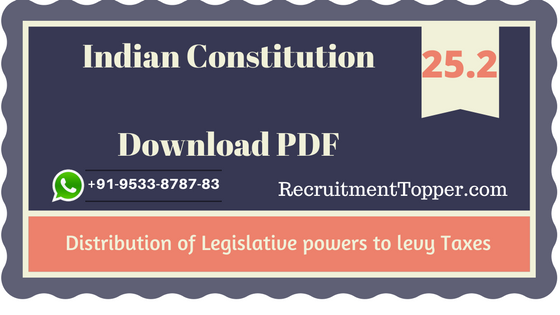Tax structure in India | Indian Constitution Download PDF
Contents
(A) The legislative power to make a law for imposing a tax is divided as between the Union and the States by means of specific Entries in the Union and State Legislative Lists in SchVII .Thus, while the State Legislature has the power to levy an estate duty in respect of agricultural lands [Entry 48 of List II], the power to levy an estate duty in respect of non-agricultural land belongs to Parliament [Entry 87 of List I]. Similarly, it is the State Legislature which is competent to levy a tax on agricultural income [Entry 46 of List II], while Parliament has the power to levy income-tax on all incomes other than agricultural [Entry 82 of List I].
The residuary power as regards taxation (as in general legislation) belongs to Parliament [Entry 97 of List I] and the Gift tax and Expenditure tax have been held to derive their authority from this residuary power. There is no concurrent sphere in the matter of tax legislation.
Before leaving this topic, it should be pointed out that though a State Legislature has the power to levy any of the taxes enumerated in the State Legislative List, in the case of certain taxes, this power is subject to certain limitations imposed by the substantive provisions of the Constitution. Thus—
Professions Tax
(a) While Entry 60 of List II of Sch. VII authorises a State Legislature to levy a tax on profession, trade, calling or employment, the total amount payable in respect of any one person to the State or any other authority in the State by way of such tax shall not exceed Rs. 2,5002 per annum [Art. 276(2)].
Sales Tax
(b) The power to impose taxes on ‘sale or purchase of goods other than newspapers’ belongs to the State [Entry 54, List If|.But ‘taxes on imports and exports’ [Entry 83, List I]and ‘taxes on sales in the course of inter-State trade and commerce’ [Entry 92A, List I] are exclusive Union subjects. Article 286 is intended to ensure that sales taxes imposed by States do not interfere with imports and exports or inter-State trade and commerce, which are matters of national concern, and should, therefore, be beyond the competence of the States. Hence, certain limitations have been laid down by Art. 286 upon the power of the States to enact sales tax legislation:
1. (a) No tax shall be imposed on sale or purchase which takes place outside the State.
(b) No tax shall be imposed on sale or purchase which takes place in the course of import into or export out of India.3
2. In connection with inter-State trade and commerce there are two limitations—
(i) The power to tax sales taking place ‘in the course of inter-State trade and commerce’4 is within the exclusive competence of Parliament [Entry 92A, List I].
(ii) Even though a sale does not take place ‘in the course of inter-State trade or commerce, State taxation would be subject to restrictions and conditions imposed by Parliament if the sale relates to ‘goods declared by Parliament to be of special importance in inter-State trade and commerce’. In pursuance of this power, Parliament has declared sugar, tobacco, cotton, silk and woollen fabrics to be goods of special importance in inter-State trade and commerce, by enacting the Additional Duties of Excise (Goods of Special Importance) Act, 1957 [r. 7], and imposed special restrictions upon the States to levy tax on the sales of these goods.
(c) Tax on Consumption or sale of Electricity
Save insofar as Parliament may by law otherwise provide, no (law of a State shall impose, or authorise the imposition or Sale of of, a tax on the consumption or sale of electricity Electricity. (whether produced by a Government or other persons) which is—
(i) consumed by the Government of India, or sold to the Government of India for consumption by that Government; or
(ii) consumed in the construction, maintenance or operation of any railway by the Government of India, or a railway company operating that railway, or sold to that Government or any such railway company for consumption in the construction, maintenance or operation of any railway [Art. 287],
(d) Exemption of Union and State Properties from mutual Taxation
The property of the Union shall, save insofar as Parliament may by law otherwise provide, be properties from exempt from all taxes imposed by a State or by any mutual taxation. authority within a State [Art. 285(1)].
Conversely, the property and income of a State shall be exempt from Union taxation [Art. 289(1)]. There is, however, one exception in this case. If a State enters into a trade or business, other than a trade or business which is declared by Parliament to be incidental to the ordinary business of government, it shall not be exempt from Union taxation [Art. 289(2)]. The immunity, again, relates to a tax on property. Hence, the property of a State is not immune from customs duty.

Leave a Reply